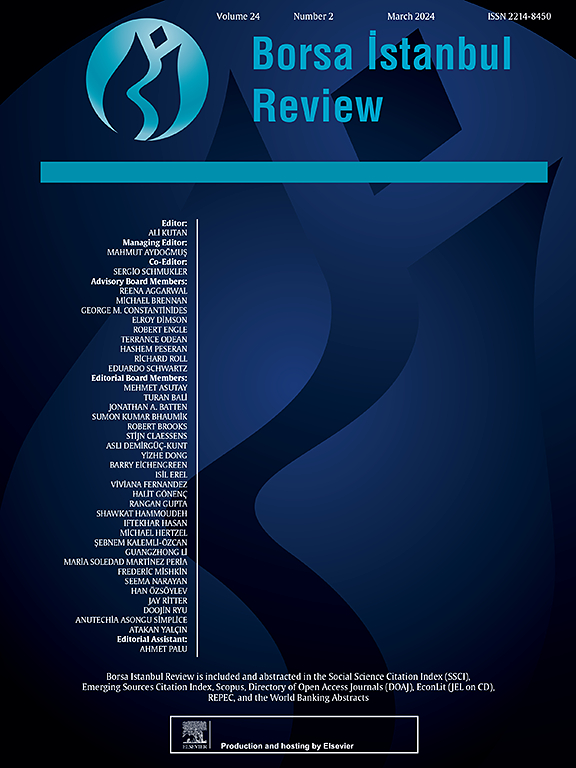The effects of non-deliverable forward programs of emerging-market central banks: A synthetic control approach
IF 6.3
2区 经济学
Q1 BUSINESS, FINANCE
引用次数: 0
Abstract
Since the Global Financial Crisis in 2008, emerging market economies’ central banks have started to use foreign exchange derivative instruments frequently in exchange rate markets to provide a hedging instrument for currency risks and to support market liquidity. In this context, the central banks of three major emerging markets—the Central Bank of Brazil, Central Bank of Mexico, and Central Bank of the Republic of Türkiye—have started to implement non-deliverable forward (NDF) auctions. In this study, the impact of the NDF programs on financial market indicators is examined using a synthetic control method, which controls for the endogeneity and causality problems commonly faced by studies on the effect of central bank exchange market interventions. The empirical findings indicate that the NDF programs of the Central Bank of Brazil and Central Bank of Mexico have a significant impact on the exchange rate level but limited impact on the volatility and no impact on risk reversals. Conversely, the NDF program of the Central Bank of the Republic of Türkiye has a significant downward impact on the implied volatility and risk reversal but no significant impact on the level of the exchange rate. The difference in the effectiveness of similar practices of these three central banks is considered to be related mostly to the size of the programs.
新兴市场中央银行非交割远期项目的影响:合成控制法
自 2008 年全球金融危机以来,新兴市场经济体的中央银行开始在汇率市场上频繁使用外汇衍生工具,以提供货币风险对冲工具和支持市场流动性。在此背景下,三大新兴市场的中央银行--巴西中央银行、墨西哥中央银行和土耳其共和国中央银行--开始实施无本金交割远期外汇(NDF)拍卖。本研究采用合成控制法考察了 NDF 项目对金融市场指标的影响,该方法控制了有关中央银行汇率市场干预效果的研究通常面临的内生性和因果关系问题。实证研究结果表明,巴西中央银行和墨西哥中央银行的 NDF 计划对汇率水平有显著影响,但对波动性影响有限,对风险逆转没有影响。相反,土耳其共和国中央银行的 NDF 计划对隐含波动率和风险逆转有显著的向下影响,但对汇率水平没有显著影响。这三家中央银行类似做法的有效性差异被认为主要与计划的规模有关。
本文章由计算机程序翻译,如有差异,请以英文原文为准。
求助全文
约1分钟内获得全文
求助全文
来源期刊

Borsa Istanbul Review
Multiple-
CiteScore
7.60
自引率
3.80%
发文量
130
审稿时长
26 days
期刊介绍:
Peer Review under the responsibility of Borsa İstanbul Anonim Sirketi. Borsa İstanbul Review provides a scholarly platform for empirical financial studies including but not limited to financial markets and institutions, financial economics, investor behavior, financial centers and market structures, corporate finance, recent economic and financial trends. Micro and macro data applications and comparative studies are welcome. Country coverage includes advanced, emerging and developing economies. In particular, we would like to publish empirical papers with significant policy implications and encourage submissions in the following areas: Research Topics: • Investments and Portfolio Management • Behavioral Finance • Financial Markets and Institutions • Market Microstructure • Islamic Finance • Financial Risk Management • Valuation • Capital Markets Governance • Financial Regulations
 求助内容:
求助内容: 应助结果提醒方式:
应助结果提醒方式:


